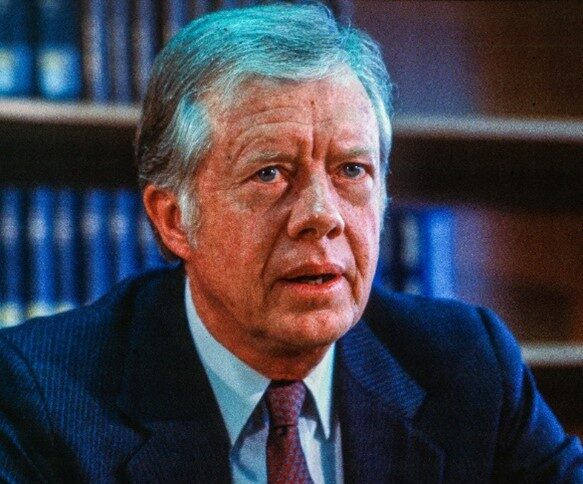
Photo by David M. Dworkin © 1983
Jimmy Carter, the 39th President of the United States, passed away on December 29, 2024, at the age of 100. He will be laid to rest next to his wife of 77 years, Rosalynn Carter, in Plains, Ga., following a state funeral in Washington, DC on January 9, 2025, which President Joe Biden has declared a national day of mourning. While his presidency from 1977 to 1981 was marked by numerous challenges that are well-documented, it was his life-long commitment to housing and community development, both during and after his time in office, that helped solidify his legacy as a champion for affordable housing and human rights. He redefined the concept of a post-presidency in America, remaining focused on his two most enduring achievements, affordable housing and international conflict resolution.
During his administration, President Carter placed a strong emphasis on addressing urban challenges and improving housing conditions for low-income Americans. In 1980, he signed into law the Housing and Community Development Act, which authorized funding for up to 290,000 Section 8 and public housing units—a 30% increase over the previous fiscal year. President Carter’s urban policy also focused on revitalizing distressed central cities, promoting economic development, and enhancing the quality of life for urban residents. His administration sought to address the complex challenges faced by urban areas through comprehensive strategies that integrated housing, economic development, and social services.
The passage of the Community Reinvestment Act (CRA) in 1977 was another significant achievement during President Carter’s administration, reflecting his commitment to equitable housing and economic opportunities. The CRA aimed to combat discriminatory practices like redlining by encouraging financial institutions to meet the credit needs of all segments of their communities, including low- and moderate-income neighborhoods. By promoting responsible lending and investment, the CRA laid the groundwork for increased homeownership and economic development in underserved areas. President Carter’s advocacy for this landmark legislation underscored his belief that access to credit and housing are essential components of community vitality and individual dignity.
President Carter’s partnership with Habitat for Humanity came to define his commitment to defining housing as a basic human right upon which all of our other basic human rights reside. “I don’t see how a family can enjoy other human rights like freedom of expression, freedom of speech, freedom of religion, the right to vote, if they live in a disreputable place of which they are ashamed and makes their family lower their standard of ethical and moral values,” he said. His work with Habitat underscored his belief that “the strength we need will not come from the White House, but from every house in America,” he said in one of his most famous, and misunderstood speeches. “We’ve got to stop crying and start sweating, stop talking and start walking, stop cursing and start praying.” The speech delivered July 15, 1979, was entitled “Energy and the National Goals – A Crisis of Confidence” but became known as the “malaise speech.”
In September 1984, he and his wife, Rosalynn, participated in their first Habitat Build in New York City, renovating a six-story apartment building. This experience inspired the annual Jimmy & Rosalynn Carter Work Project, where the Carters volunteered their time and labor to build and improve homes alongside future homeowners and volunteers.
Even well into his 90s, President Carter remained actively involved in Habitat projects, embodying a tireless commitment to service. His leadership and dedication not only provided tangible housing solutions but also inspired countless individuals to engage in community development efforts worldwide.
Beyond his direct contributions to housing, President Carter’s post-presidential years were marked by a broader commitment to humanitarian efforts. In 1982, he and Rosalynn founded The Carter Center, an organization dedicated to promoting human rights, alleviating human suffering, and advancing peace and health worldwide. His dedication to these initiatives earned him the Nobel Peace Prize in 2002, recognizing his decades-long efforts in diplomacy, human rights, and social justice.
As we reflect on his passing, the National Housing Conference honors the enduring contributions he made to housing and community development.

